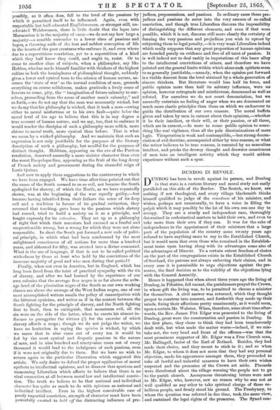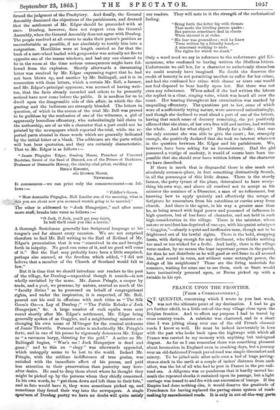DUNBOG DT REVOLT.
nUNBOG has been in revolt against its parson, and Dunbog Ll in that state is a curious literary and moral study not easily paralleled on this side of the Border. The Scotch, we know, are nothing if not theological, and every village blacksmith thinks himself qualified to judge of the soundness of his minister, and wishes, perhaps not unnaturally, to have a voice in filling the pulpit which it may possibly be the lot of his own son one day to occupy. They are a sturdy and independent race, thoroughly determined in ecclesiastical matters to hold their own, and even to take more than their own if they can. It was for the sake of independence in the appointment of their ministers that a large part of the population of the country some twenty years ago refused to have anything more to say to the Established Church, but it would seem that even those who remained in the Establish- ment insist upon having along with its advantages some also of the advantages of Dissent. To a certain extent freedom of choice on the part of the congregations exists in the Established Church of Scotland, the patrons not always enforcing their claims, and in every ease it is permissible to urge objections against the pre- sentee, the final decision as to the validity of the objections lying with the General Assembly.
Hence it happened that when about three years ago the living of Dunbog, in Fifeahire, fell vacant, the parishioners prayed the Crown, in whose gift the living was, to be permitted to choose a minister for themselves. A civil answer was returned, which they thought proper to construe into consent, and forthwith they made up their minds, fixing their affections pretty unanimously, as it would seem, upon a certain Mr. Webster. When, therefore, some short time after- wards, the Rev. James Pitt Edgar was presented to the living of Dunbog, great were the consternation and passion in Dunbog. In the first place, they chose to think they had been treacherously dealt with, but what made the matter worse—indeed, if we mis- take not, the very head and front of the offence—was that the most prominent supporter of Mr. Edgar was a Free Church man, Mr. Ballingall, factor of the Earl of Zetland. Besides, they had made their choice, and they meant to stick to it ; and so when Mr. Edgar, to whom it does not seem that they had any personal objection, made his appearance amongst them, they proceeded to take all lawful and unlawful measures to have their own wishes respected and the presentee of the Crown set aside. Placards were distributed about the village warning `the people not to go to the parish church. Anonymous threatening letters were sent to Mr. Edgar, who, however, saw no reason why he was not as well qualified as any other to take spiritual charge of these re- bellious people, and firmly stood his ground. The Presbytery, to whom the question was referred in due time, took,the same view, and sustained the legal rights of the presentee. The Synod con- firmed the judgment of the Presbytery. And finally, the General Assembly dismissed the objections of the parishioners, and decreed that the settlement of Mr. Edgar should be proceeded with at once. Dunbog, however, does not respect even the General Assembly, when the General Assembly does not agree with Dunbog. The people resolved at all events to make their pastor's position as uncomfortable as possible, if not absolutely to terrify him into a resignation. Hostilities were at length carried so far that the bush of a cart-wheel loaded with gunpowder was actually set fire to opposite one of the manse windows, and had any one chanced to be in the room at the time serious consequences might have fol- lowed from the explosion. Shortly afterwards a threatening letter was received by Mr. Edgar expressing regret that he had not been blown up, and another by Mr. Ballingall, and it is in connection with these letters, which a certain Mr. Bell, a farmer, and Mr. Edgar's principal opponent, was accused of having writ- ten, that the facts already recorded and others to be presently noticed have now come before the public. It is needless for us to dwell upon the disagreeable side of this affair, in which the dis- gusting and the ludicrous are strangely blended. The letters in question, of which in the course of the trial Mr. Bell was proved to be guiltless by the confession of one of the witnesses, a girl of apparently boundless effrontery, who unhesitatingly laid claim to the authorship, are of so vile a character that a part could not be printed by the newspapers which reported the trial, while the re- ported parts abound in those words which are generally indicated by the initial letter or a blank. The addresses are the parts which will beat bear quotation, and they are certainly characteristic. That to Mr. Edgar is as follows :—
" Jambe Pitgogles Edgar, Dunbog Manse, Preacher of Unsound Doctrine, Sower of the Seed of Discord, son of the Prince of Darkness, Professor of Damnable Heresy, the charity-clad priests residing at Hnta.'s Erromnf, alis DuNsoG MANSE,
NEWBURGH.
It commences—we can print only the commencement—as fol- lows :— " Fiddler's Green.
"Most damnable Pitgogles, Hell Lucifer son of the morning, what is :4this you are about now you accursed wretch going to be married."
?he other is addressed to "Jock Hungerjaw," and after some more stuff, breaks into verse as follows :— " 0 Jock, 0 Jock, you'll get your fairin, In hell the'll roast you like a herrin."
A thorough Scotchman generally has Scriptural language at his tongue's end for almost every occasion. We are not surprised therefore to find Mr. Bell writing to the Earl of Zetland of Mr. Edgar's presentation that it was "conceived in sin and brought forth in iniquity. No good can come of it, and no good will come of it." But the Earl may probably have been a little surprised, perhaps also amused, at the freedom which added, "I did not believe that a member of the Church of Scotland would fall so low."
But it is time that we should introduce our readers to the poet of the village, for Dunbog—unpoetical though it sounds—is not wholly unvisited by the muse. Mr. James Pringle, a cooper by *rade, and a poet, we presume, by nature, exerted so much of the "faculty divine" as he possessed on behalf of congregational rights, and under the inspiration, it is suspected, of Mr. Bell, poured out his soul in effusions with such titles as "The Silk Goon's On—a Lay of Dunbog ;" "The Public Rebuke o' Jock Hungerjaw," &c. A large number of such squibs were sent round shortly after Mr. Edgar's settlement, Mr. Edgar being generally spoken of as Goggles, and a neighbouring minister ex- -changing his own name of M'Gregor for the comical nickname of Jamie Thwattle. Personal satire is undoubtedly Mr. Pringle's forte, and in one of his poems he vigorously denounces Mr. Edgar as "a ravenous harpy, thirsting for the gold." A satire on Mr. Ballingall begins, " Wae's me Jock Hungerjaw is dead and Lane ;" and to this an " elegy " was afterwards appended, which unhappily seems to be lost to the world. Indeed Mr. Pringle, with the sublime indifference of true genius, was satisfied with the immediate effect of his poems, and paid less attention to their preservation than posterity may here- after desire. He used to drop them about where he thought they might be picked up by the persons whom they chiefly concerned. In his own words, he " put them down and left them to their fate," and as fate would have it, they were sometimes picked up, and sometimes they found their way into the newspapers. A single specimen of Dunbog poetry we have no doubt will quite satisfy our readers. They will note in it the strength of the ecclesiastical feeling.
"Bring forth the letter big with threats That made the hireling parson quake ; But parsons sometimes deal in cheats When interest is at stake.
"His fear was groundless ; well he knew 'Twas written by a friendly hand,— A miscreant working to undo The rights for which we stand."
Only a word need we say in reference to the unfortunate girl Ed- monstone, who confessed to having written the libellous letters. Unfortunate we call her, for a character so audaciously shameless we could scarcely have imagined. No doubt she deserves the credit of honesty in not permitting another to suffer for her crime, and had she confessed her crime with shame or tears one would not feel disposed to bear hardly upon her. But there was not even any reluctance. When asked if she had written the letters she replied in a clear, ringing voice, which was heard all over the court. Her bearing throughout her examination was marked by unquailing effrontery. The questions put to her, some of which were of a sufficiently trying nature, were answered unhesitatingly, and though she declined to read aloud a part of one of the letters, having that much sense of decency remaining, she yet positively affirmed that she alone, of her own free will and motive, had written the whole. And for what object? Merely for a frolic ; that was the only account she was able to give the court ; for, strangely enough, she positively declared that she took no interest whatever in the question between Mr. Edgar and his parishioners. We, however, have been asking for an inconsistency. Had the girl possessed a vestige of modesty, it would of course have been im- possible that she should ever have written letters of the character we have described.
If there is much that is disgraceful there is also much not absolutely common-place, in fact something distinctively Scotch, in all the personages of this little drama. There is the sturdy farmer, the petty tyrant of the place, determined to have every- thing his own way, and above all resolved not to accept as his minister the nominee of a Dissenter, a man of no refinement, but knowing how to apply quaintly and effectively the scraps of Scripture he remembers from his catechism or carries away from church. And there is the agent, in his way a greater man than he, as being armed with legal power and possessed of influence in high quarters, but of less force of character, and not held in such high consideration in the village. There is the minister, whom nature or accident has deprived of one eye, with his quaint sobriquet
"Goggles,"—clearly a quiet and inoffensive man, though not to be frightened out of his lawful rights. There is the bold, strapping
lassie, with daring enough for any devilment, who thinks nothing too mad or too wicked for a frolic. And lastly, there is the village verse-maker, by no means the least important person in the parish, for does he not distribute as he will good or evil fame to all around him, and record in verse, not without some untaught power, the doings of his neighbours? These are the living materials for romance, waiting for some one to use them, such as Soott *would have instinctively pounced upon, or Burns picked up with a twinkle in his eye.































 Previous page
Previous page